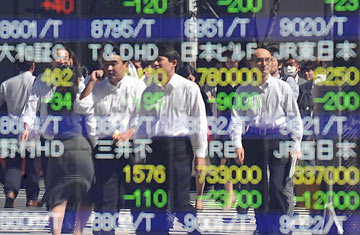
Pedestrians are reflected in a window in front of an electric quotation board displaying the Nikkei key index of the Tokyo Stock Exchange in Tokyo.
During his Nov. 13 visit to Tokyo, U.S. President Barack Obama emphasized that Japan, as the world's second largest economy, has a special role in the global marketplace. One week later, it's becoming clear the country may be special for another reason. While much of the rest of the planet frets about a coming rise in inflation — a consequence of economic recovery, massive stimulus spending and a weakening dollar — Japan faces the opposite problem: a potentially devastating bout of deflation.
Figures released this week indicated Japan may be climbing out of its worst recession in decades. Third quarter GDP growth came in at an annualized rate of 4.8%. But other statistics painted a more troubling picture. The price of goods and services slid by 2.6% in the third quarter, the biggest drop since 1958. Consumer prices have dropped for seven straight months. "The recent price falls are not right and worrisome," Japan's Finance Minister Hirohisa Fujii said at a Nov. 20 press conference. "This is one of the major policy issues right now." Deputy Prime Minister Naoto Kan was even more blunt. He stated flatly this week that the country is "in a deflationary state."
While a little inflation is considered normal and healthy for growing economies, a prolonged deflationary period is a recipe for economic misery. Falling prices drag down corporate earnings, wages, consumer spending and investment by businesses, and can lead to a deflationary spiral like the one the world experienced during the Great Depression. "If price deflation leads to asset deflation and that leads to further deterioration, then that will lead to the collapse of the economy," says JPMorgan Securities chief economist Masaaki Kanno. Deflation has periodically plagued the Japanese economy for the last 15 years, ever since a spectacular asset bubble burst in the early 1990s. One of the country's revered economic figures is Korekiyo Takahashi, a former prime minister and finance minister who is credited with reining in raging deflation in the early 1930s, sooner than the U.S. was able to fend it off.
So far, Japan's central bank has dismissed the possibility the country could enter a deflationary death spiral. On Friday, the Bank of Japan upgraded its outlook for the Japanese economy and left interest rates at 0.1%. "The BOJ doesn't want to take any aggressive policy measures because it doesn't think the status quo is so harmful," says Kanno of JPMorgan Securities.
But Jesper Koll, president and CEO of Tantallon Research Japan, argues that when falling prices are factored in, the country's nascent recovery is weaker than recent positive GDP growth numbers suggest. "We've got the consumer price index falling by 2.5%, wages falling by about 2.0%, winter bonuses falling by about 14%, and the Nikkei (stock market index) going down," he says. "All the growth we're seeing is because of arithmetic." Complicating matters is the strength of the Japanese yen, which has gained 6% on the dollar in the last three months. Prices generally decline in a strong currency environment; a rising yen cuts into Japanese firms' corporate profits and margins and makes companies less competitive abroad.
R. Taggart Murphy, a professor at the University of Tsukuba's business school in Tokyo, points to a now familiar Keynesian solution to deflation: more fiscal stimulus. But he says additional government spending is constrained by the country's already high debt load, which is approaching 200% of GDP. "Even if the DPJ (the Democratic Party of Japan, the country's ruling party) decided that their principle policy objective would be to end deflation," he says, "it's not quite clear to me how they'd go about it."
Murphy says that a silver lining in the deflationary cloud is that it reduces prices for consumers on products such as household items. Ultimately, though, he says deflation is a symptom, not a cause, of fundamental economic ills. "You want to treat the underlying cause and that is declining economic vitality, such as not enough investment in new companies, etc." In other words, if Japan can make progress in overcoming its chronic economic malaise, deflation will eventually disappear without a direct attack by policymakers.
